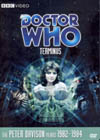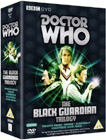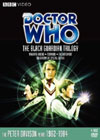DVD Extras include:
A Functioning First EpisodeSurprisingly, the first episode is the best of the bunch, and largely works as a whole. It is quite firmly grounded in exploring the unknown, which this time around really feels unknown, atmospheric, and creepy. At the time when I first saw it, it was exactly the variety I had been hoping for, to balance the brighter, more heavily populated stories that had preceded this one.The story opens by giving us plenty of the deep TARDIS interior, and a rare glimpse at daily life aboard the Doctor's vehicle while in flight. Tegan and Turlough get the best bits of this for sure, and continue to have many rewarding character interactions scattered throughout the rest of the story. Bizarrely, the Doctor himself is left out of this sequence until the first crisis for him to solve comes along, which perhaps makes one all the more curious to know how he spends his leisure time aboard ship. The police box and the usual materialization starting off an adventure are put to the side in favour of a completely new way of getting our main characters into the adventure. Well, we certainly won't be marring a classic by leaving the usual good stuff out, and in fact the new methods employed here are fascinating and worthy of being explored as much as they are. Dave Chapman's original video effects during this sequence are one of the story's grandest achievements, however the new CGI effects prove their worth also by reconstructing very convincing vistas of TARDIS corridors for the effect to work on. Both versions are great. An unusually high sense of alien creepiness takes over the story for the rest of the first episode, as well as the beginning of the second, largely due to the unknowns surrounding the ship and its ominous-sounding destination. What sustains this tension is largely the fact that we don't properly meet any people (or alien characters) from these places for such a long time. We encounter empty corridors marked with skulls, automated ship systems, rattily-clad arms pleading and trying to claw their way out from behind half-open doors, and a speechless multi-armed robot with a creep factor that the similarly-designed Daleks haven't enjoyed since they too were unknowns in their first story. Even when Kari and Olvir join the cast, they too are quickly put on unsure and uneasy footing about the place, and have to explore it as much as the TARDIS crew. Perhaps the last sequence to enjoy this tension is our very first glimpse of the Vanir, because Eirak gets only one ominous word to pass on to the creepy robot, while the audience is left for some time to wonder who or what he is and what his motivation and temperament might be.
Collapse of Philosophy and PlotOnce the story has all its major elements in play, it proceeds to fall apart and never really recovers. One problem seems to be the way the characters are all arbitrarily divided up into pairs during the middle acts, and the sparse interaction and/or conflict between one pair and another, where it exists at all, feels extremely poor and artificial. The repetitive wrestling matches are particularly un-sci-fi, unsophisticated, poorly motivated, and limply executed. More to the point, why aren't these parties talking to each other instead? Why do we spend so much screen time watching them miss each other as well? Peter Davison's oft quoted remark that the character idea for Turlough couldn't work because you had to lock him up in episode one and not let him out until episode four - this isn't really a problem inherent to Turlough's arc. It really only happens in this story, and if you look closely enough, a variation of "solitary occupation" is happening to every other pair of characters in this tale as well. Contrast this with JNT's written brief (included in the extras in the trilogy DVD box set) for what should happen with the Turlough character in the second story of his arc, and you'll see that the idea for Turlough was properly time-limited with projected developments far more interesting than what was presented here. The biggest problem with Turlough boils down to drab writing on one particular story.As with his previous story, "Warriors' Gate" (story no. 114), writer Steve Gallagher tackles some interesting philosophical ideas, and this time around they are much, much more understandable. Sadly, he still doesn't seem to be able to take an informed or inspiring position on what he brings up, some of which grates very distastefully against more useful approaches that I have since taken to heart. One interesting idea that comes through now and again in the dialogue is that of Terminus as a corporate entity where no one cares; the resolution of course being that people start to care and band together. Great! If only this idea had been expanded upon and developed into the center-piece of the adventure, it could have turned into something far better received. Instead, it is easily overlooked and forgotten, as it gets overshadowed by more damning concepts. The idea that Terminus actually works as a center for healing reflects soon-to-be outdated concepts of Western medicine, namely that disease is an external invasion that needs to be destroyed with weapons like radiation. It is particularly ridiculous to think that mass exposure to a radioactive engine meltdown cures more people than it harms. Have a good watch of the Harrison Ford / Liam Neeson movie K19, based on the true story of a radioactive engine disaster on board a cold war Russian submarine, for a MILD version of what really happens. In this sense, "Terminus" becomes a polar opposite of the philosophy and healing power demonstrated two stories earlier in "Snakedance" (story no. 125). But why stop at health when you can mess up the origin of the universe as well? Yup. After failing to create quality interaction and conflict with the characters and their situation, Terminus climaxes, way too early, with the threat of the accidental destruction of nothing less than the entire universe. This is also said to be a repeat of the accident that created the universe in the first place. Of course, those of us who have experienced consciously working with the unified field of quantum intelligence out of which the matter, energy, and other elements of the universe are constructed can no longer entertain the philosophy of purely random mechanistic causes as any kind of profound explanation of anything. It falls too flat, and we've moved beyond. We can still appreciate characters who mistakenly believe it though. What a great pity that the bogus philosophy in this story comes out of the mouth of the Doctor though. We deserve to expect better of him. The extras reveal interesting things about the script development, suggesting that even here too much tinkering went on by people higher up in the production's pecking order. Indeed, the ORIGINAL idea was that of our universe being created by a malfunctioning ship from ANOTHER universe, an idea so whittled down by the time explanatory dialogue gets spoken on screen that one can easily come away with the impression that Terminus originated in our universe, and then looped back in time to create the universe that it was a part of. And which came first, the chicken or the egg? It becomes too silly to believe in. Now, I love the idea of discovering an unmoving pilot from another universe in a spacesuit at the center of our own. It's great imagery, and it triggers the imagination of the audience in ways that no amount of explanation should try to overwrite. Space for the audience to fill in the gaps, or at least to choose for themselves which of several offered theories might be the truth, would have returned the status of art to this story. The Doctor stopped some kind of engine / fuel disaster in this tale. I just don't buy that the threat he prevented actually matched his theory, or Bor's. But really, by the time the tinkering has caused this story to center instead on a morbid hospital scenario for Nyssa to fix, the relatively short creation segments of the adventure seem tacked on and out of place. The Nyssa-centric main plot needs better interaction with the Vanir; resulting in conversation instead of wrestling. Part Four's lengthy wrap-up actually delivers a lot of what I'd want in that regard, although it feels like stuff that should happen prior to a story's climax rather than after. Perhaps the exciting climax should have been dealing with the corporation after everyone else has banded together. Nyssa's logic that the corporation would be unable to convince soldiers to come to Terminus doesn't hold up if she intends to be successful in turning the place into a proper hospital that no longer strikes fear in the hearts of its patients. If Terminus becomes a success, the corporation will turn up wanting their due. Now if only they had representatives in the story to drive the real conflict in the final act, "Terminus" might not be such an anti-climactic story.
Character Functions and Other RolesIt is a bit bizarre that, with three companions aboard the TARDIS, the Doctor winds up paired with the pirate Kari for the bulk of the story, who then fulfils the traditional function of pulling explanations out of the Doctor for the audience and helping him get out of trouble. Kari really only works as her own character in the earliest sections of the story. Once she leaves the liner's control room with the Doctor, she seems to have forgotten her urgent need to escape in the TARDIS, and just blandly tags along behind the Doctor.Andrew Burt works inventively to create a lot of really nice character moments for Valgard, when he is allowed to interact normally with other characters. I think though that perhaps the idea of giving him his own quest within the story really bent the whole plot out of shape. With four TARDIS characters and two pirate characters all looking for something to do in the script, adding yet a seventh protagonist is a bit much. At the very least, I don't think the motivation was there to turn a tired hospital porter into a pseudo-Norse warrior when his "adversaries" meant him absolutely no harm anyway, and sadly these portions that no actor could hope to salvage tend to overshadow Burt's excellent moments. Most of the Vanir cast do manage to put in some good and sympathetic performances, making the best of what they were given to work with. Peter Benson manages to make a really enjoyable success out of Bor, possibly the best character in the story, and he has a lot of really entertaining exchanges with Peter Davison. Good stuff. Director Mary Ridge proved her talent for making great British sci-fi TV in many a Blake's 7 episode, including its heart-stopping finale, prior to her sole effort for Doctor Who here. Sadly, the challenges piling up against her here proved to be too many to overcome. But lack of communication of vision between various department heads seems to have triggered many of the nasty surprises that came at her, and with JNT able to provide extra studio time to complete things, I don't think she should be immune from criticism over the final, disappointing result. Roger Limb delivers a mostly listless, uninspiring score for this story, where most of the best memorable bits are liberally borrowed from previous stories. His own composition, "Nyssa's Theme", returns from the musically superior "The Keeper of Traken" (story no. 115), and gets some particularly good new renditions during part four. Adric's Theme makes a very noticeable return as well, and as this is borrowed from fellow composer Paddy Kingsland, it doesn't seem too much of a stretch to believe that notes from the extremely simple and barely distinguishable Turlough-Guardian music have also been lifted from Kingsland's score for "Mawdryn Undead" (the previous story) as well. While this is all good, it's what Limb manages to come up with as "original" material to fill in the remaining gaps that creates most of the flak for his score: the same light & buzzy Radiophonic instruments he's been using since day one playing seemingly random stuff that inspires no specific emotion in his listeners. Why even bother dubbing it on? To be fair, I do think some good stuff was achieved near the end of episode one, particularly when the Terminus space station first appears on screen. While this score represents the last of the uninspiring overdose of Limb's music that has spanned four of the last seven stories, it is interesting to note that we now get a good long break from him until he largely redeems himself in "The Caves of Androzani" (story no. 136) over a year later. Interestingly, his final cue of Terminus part one seems to foreshadow the style he will later blossom into. Sarah Sutton's Nyssa gets a mostly drab and wimpy role for the bulk of this story, spending a bit too much time being sick, getting carted around listlessly, and screaming at ill-conceived creatures like the disastrously realised Garm. Her redeeming bits, apart from her opening scenes being a scientist in the TARDIS, are all packed into episode four, where Nyssa is finally given her due as a character, and about time too. Though she is given an emotional exit that works, the thought that the drab depression of Terminus doesn't end for her after these four episodes makes one wish she could have had a better exit story, and perhaps not for another year or two.
International Titles:Magyar: "Végállomás"Français: (Terminus)Русский: "Терминус"This story is available on DVD as the second adventure of the Black Guardian Trilogy. Click on the Amazon symbol for the location nearest you for pricing and availability:
Comments on this article are welcome. You may contact the author from this page:
|









